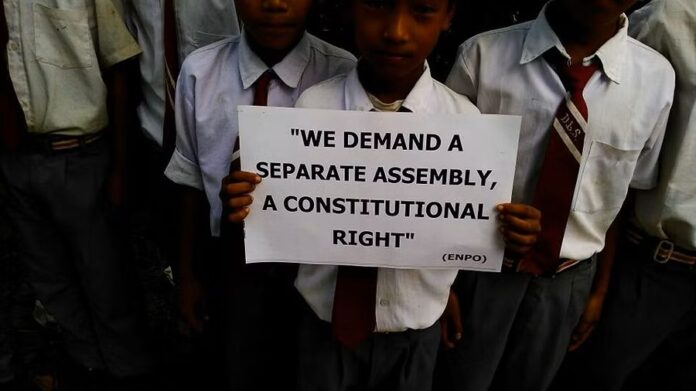Nagaland, nestled in the northeastern fringes of India, is often hailed for its rich cultural tapestry and vibrant traditions. However, beneath the surface of its scenic landscapes lies a simmering cauldron of political discontent and unresolved grievances. At the heart of this unrest lies the Eastern Nagaland People’s Organisation (ENPO), a vocal advocate for the creation of a separate state comprising the districts of Tuensang, Mon, Longleng, and Kiphire. In a bold assertion of their demands, the ENPO has reaffirmed its boycott of the Lok Sabha elections until its longstanding aspiration for statehood is met, thrusting Nagaland’s political landscape into a state of uncertainty and flux.
The ENPO’s demand for a separate state emanates from the perceived neglect and marginalization of the eastern districts of Nagaland, which have long felt disenfranchised and overlooked in the state’s development narrative. Historically, these districts have grappled with infrastructural deficiencies, economic stagnation, and inadequate access to essential services, exacerbating feelings of alienation and neglect among their inhabitants. In the eyes of the ENPO, the creation of a separate state would not only redress these grievances but also pave the way for equitable development and empowerment of the region’s populace.
The decision to boycott the Lok Sabha polls represents a calculated strategic move by the ENPO to leverage its political clout and press for its demands on the national stage. By abstaining from the electoral process, the organization seeks to send a clear message to the central government and mainstream political parties that the aspirations of the eastern Nagaland populace cannot be ignored or sidelined any longer. It serves as a potent reminder of the simmering discontent and disillusionment simmering beneath the surface of Nagaland’s political landscape, demanding urgent attention and redressal.
However, the ENPO’s boycott stance has sparked a polarizing debate within Nagaland’s political corridors, with proponents and detractors alike voicing divergent opinions on the efficacy and legitimacy of such a move. While supporters argue that the boycott serves as a powerful tool for political mobilization and advocacy, critics contend that it risks further exacerbating divisions within the state and impeding the democratic process. Moreover, skeptics question the feasibility of achieving statehood through boycott tactics alone, advocating instead for a more nuanced and inclusive approach to negotiations and dialogue.
The ENPO’s boycott stance also raises pertinent questions about the broader implications for Nagaland’s electoral dynamics and democratic governance. With a significant portion of the electorate in the eastern districts refraining from participating in the polls, there looms the specter of voter disenfranchisement and diminished representation in the corridors of power. Furthermore, the boycott threatens to exacerbate existing fault lines within Nagaland’s political landscape, potentially fueling tensions and polarizing sentiments along regional lines.
In response to the ENPO’s boycott call, the government of Nagaland has sought to initiate dialogue and engagement with the organization in a bid to address its grievances and explore avenues for reconciliation. Chief Minister Neiphiu Rio has expressed willingness to engage in meaningful discussions with the ENPO and other stakeholders to find an amicable resolution to the statehood issue. However, achieving consensus and finding common ground amidst divergent interests and entrenched positions remains a formidable challenge, requiring sustained efforts and political will on all sides.
As Nagaland grapples with the ramifications of the ENPO’s boycott stance, there is a pressing need for constructive dialogue, compromise, and reconciliation to chart a path forward towards sustainable peace and development. The creation of a separate state may hold the promise of addressing longstanding grievances and fostering inclusive growth, but it must be pursued through democratic means and within the framework of constitutional norms and processes.
In addition, the ENPO’s reaffirmation of its boycott of the Lok Sabha polls until its demand for a separate state is met underscores the complexities and challenges inherent in Nagaland’s political landscape. It represents a bold assertion of the region’s aspirations and grievances, demanding urgent attention and redressal from the central government and mainstream political parties. As Nagaland navigates this tumultuous terrain, the imperative for dialogue, consensus-building, and inclusive governance has never been more pronounced, offering a glimmer of hope for a future of peace, prosperity, and equitable development.



